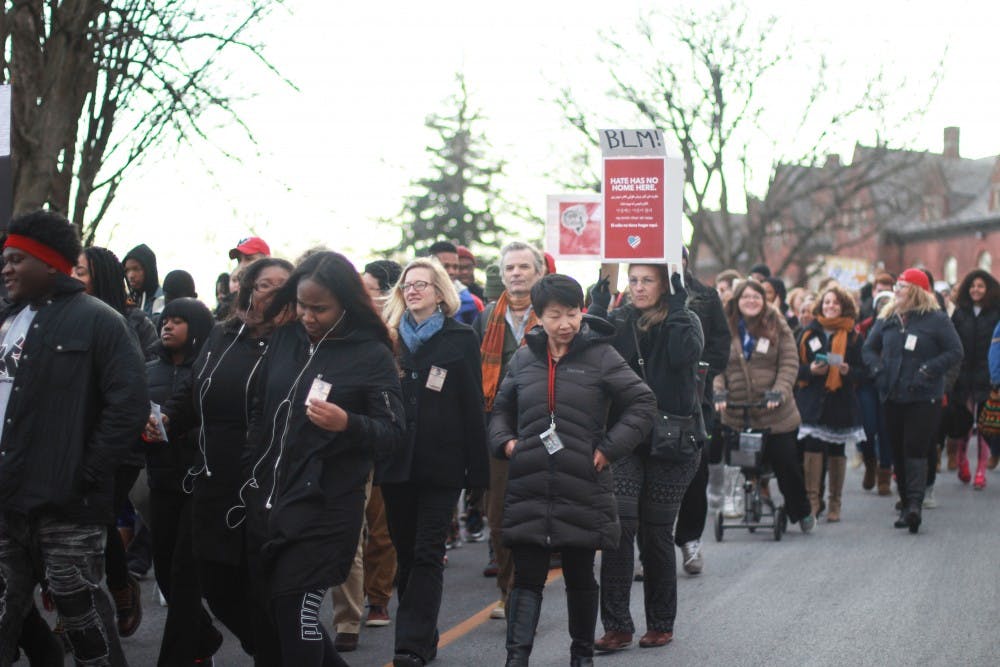Almost two weeks after President Donald Trump’s inauguration, several Shippensburg University organizations joined together to host the 30th annual March for Humanity on Thursday.
This year’s march was sponsored by SU’s African American Organization (Afro-Am) and Multicultural Student Affairs (MSA), as well as the departments of social equity, ethnic studies and political science. Many more organizations sponsored the event this year; however, Afro-Am has hosted the march consistently for the past three decades.
Each year, the event honors the memory of the Rev. Martin Luther King Jr. and strives to bring the students, faculty, staff and community members together to promote equality, peace and love.
King was believed by many to be a pioneer in civil rights and forward thinking. During his lifetime, King led the civil rights movement and won a Nobel Peace Prize.
Before his assassination in 1968, King led numerous marches and peaceful protests throughout the United States. According to this year’s guest speaker, Julianne Malveaux, marches such as the March for Humanity and the Women’s March follow the spirit of the marches led by King.
The theme of this year’s march was “America has spoken: We will not go back,” which was chosen in light of November’s presidential election. The March for Humanity is important now more than ever, according to director of Multicultural Student Affairs Diane Jefferson.
Jefferson said this year’s march is a “people’s march” that welcomed anyone who wanted to attend to support one another.
Guest speakers and SU students Amber Naecker, Ana-Lopez Marinez, Joshua Smith and Rhabeah Ji’lami discussed the reasons why they chose to march, listing reasons such as to honor the civil rights movement, to fight against discrimination, to protect LGBT rights or because they felt the need to not be silent any longer. A mime tribute by student Rodney Walker followed over the speakers to the song “The Storm is Over Now.”
Malveaux then took to the podium to discuss the message behind the annual March for Humanity. Malveaux said America has not spoken out about the nation’s oppression, and that issues like voter suppression and Americans choosing not to vote on Election Day are the main reasons why Trump won the November presidential election.
However, Malveaux reiterated that we will not, should not and cannot go back to a time where people of color and women were oppressed throughout the U.S.
She also said it is time to give the baton to the younger generation to make a difference in the face of hate and oppression.
“First we march, then we organize,” Malveaux said. “The arc of the moral universe is long but it bends toward justice.”
Jefferson followed Malveaux’s speech and discussed the process of watching the march grow into the event it is today. She spoke of the newest victory for women’s rights at SU with Interim President Barbara Lyman becoming SU’s first African-American female president.
Jefferson said she was grateful and happy for Lyman’s success, and said Lyman has been a longtime supporter of the March for Humanity and MSA.
Following Jefferson’s speech, students, faculty and members of the Shippensburg community picked up their picket signs and got in formation in front of Old Main to begin marching to the Ceddia Union Building (CUB). The procession made its way into Reisner Dining Hall’s Tuscarora Room for light refreshments.
Some SU students who were at this year’s March for Humanity were also at the Women’s March in Washington, D.C., on Jan. 21 and compared the two.
“The march gave me the feeling that D.C. did; not completely but it felt good to bring it here,” sophomore Nia Primus said.
Graduate student Mary Butler said although the atmospheres of the two marches were different, the message stayed the same.
“The titles of the events were different but the essence was the same for me — empowerment for all people,” Butler said.
According to Jefferson, there is still much work to be done to end the oppression that is occurring nationwide.
“We had the vigil. We had the march. Now we need an action plan,” Jefferson said to the crowd. “We will always be stronger together.”




The Slate welcomes thoughtful discussion on all of our stories, but please keep comments civil and on-topic. Read our full guidelines here.